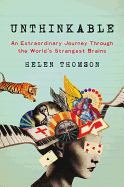
Science journalist Helen Thomson's first book, Unthinkable: An Extraordinary Journey Through the World's Strangest Brains, draws inspiration from the late Oliver Sacks in its empathetic portraits of people whose brains shed light on neuroscientific thought. Thomson seeks to revive the classical case study in all of its humanistic detail, forgoing bloodless objectivity for quirky explorations of the subjects' personalities. Thomson introduces the reader to Bob, whose memories never seem to fade; Rubén, who sees colorful auras when he looks at people; and Matar, who perceives himself turning into a tiger. Thomson uses these outlying cases to reflect on the typical functioning of the brain, explaining aspects of the brain that are relatively well understood, as well as delving into more obscure territory.
In surveying the unusual, Thomson reminds the reader that there are many perspectives on reality--perspectives that can shift with surprising ease, as can personalities. When writing about Luke, who developed pedophilic urges due to a tumor, Thomson concludes: "We tend to think of our personality as something that is steadfast and strong, but in truth it can rapidly desert us." Along with this discomfiting thought comes appreciation for the staggering variety of human experience. Sylvia's persistent auditory hallucinations, for example, come in the form of musical passages that she mostly tries to ignore. The case studies described in Unthinkable vary in degree from benign to frightening, but each serves as a useful entry point into a fascinating field of study. --Hank Stephenson, bookseller, Flyleaf Books, Chapel Hill, N.C.

